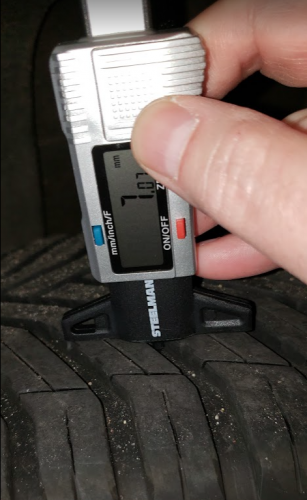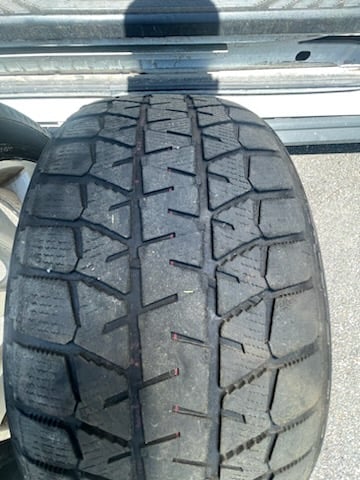Winter tires are amazing in cold, snowy, and icy weather. The special softer compound contains silica, which does wonders for icy weather. The tread design uses sipes, small cuts in the tread, to help grip and retain snow (since snow on snow is grippier than snow on cold pavement). The tread blocks contain wide spaces or gaps to allow for deep snow capability. While these are all great things in cold and snowy weather, they work against you in warm conditions.
Related Story: Long-term Test of Michelin CrossClimate2 All-Weather Tires
Torque News is made up of authors who have had a wide range of life experiences, including being of limited means during our lifetimes. We know what it is like to be looking at a tire replacement bill of $600 to $1,200 and thinking, “How can I just get one more season before paying for a new set of tires?” Well, one way may well be to just drive the rubber off your old winter tires. Let’s look at the pros and cons of doing so.

Why You Should Use Up Your Winter Tires Over the Summer
Winter tires have two sets of wear bars on them. The first is higher and denotes the safe winter tread depth. Then there are lower-down treadbars that denote the safe use of the tires in spring, summer, and fall. If you have reached the second set of wear bars, it is time to get new tires now. They are no longer safe.
However, if you are still above those, or on the very edge, you can drive on the tires in spring, summer, and fall. Drive safely, use good judgement in hard rain or over standing water, and plan for your new tires in fall.
You will find that winter tires wear much more quickly than all-season tires, so check those tread bars frequently. The main downside to using old winter tires in summer is noise and perhaps sloppy handling.
Why Change Out Your Worn Winter Tires Now
Your stopping distances and wet-weather grip will be better on new summer or all-season tires than on old snow tires. If you want the best performance for your vehicle, change the old snows after their last season of winter tread life. You will enjoy your vehicle much more in summer on new all-season or summer-only tires.

The bottom line is that you need to have adequate tread across all sections of the tire’s footprint, not just the outer edge or middle. Note the differences in tread depth on the tire in our example image. Be certain your old winter tires are safe before you use them in summer. Any mechanic or trie store can help you if you are uncertain about how to check them yourself, and please, forget the silly penny method. It is not good way to inspect tires.
John Goreham is an experienced New England Motor Press Association member and expert vehicle tester. John completed an engineering program with a focus on electric vehicles, followed by two decades of work in high-tech, biopharma, and the automotive supply chain before becoming a news contributor. In addition to his eleven years of work at Torque News, John has published thousands of articles and reviews at American news outlets. He is known for offering unfiltered opinions on vehicle topics. You can follow John on Twitter, and TikTok @ToknCars, and view his credentials at Linkedin
Image of worn snow tires by John Goreham
Set as google preferred source












Comments
Not more than ~2% of the U.S.
Permalink
Not more than ~2% of the U.S. population takes the time and effort to switch to snowtires seasonally – I didn’t.
Approximately 40% of the U.S. population does not reside in a snow area. With this information, the concept of a compromise “all-season” tire results in what I’ve
been experiencing - compromised tier designs - for a winter that is not experienced.
“Summer tires” are usually “high-performance”, more suited to the track than
typical driving. With thousands of tire choices, it is frustrating that nearly none
offer an excellent 3-season tire, for the southern climate.